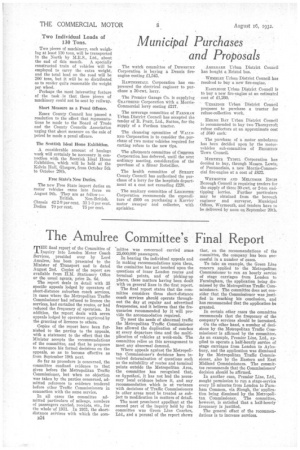The _Amulree Committee's Final Report
Page 42

If you've noticed an error in this article please click here to report it so we can fix it.
THEHE final report of the Committee of Inquiry into London Motor Coach Services, presided over by Lord Amulree,• has been presented to the Minister of Transport and is dated August 2nd. Copies of the report are available from H.M. Stationery Office or the usual agents, price 2s. 6d.
The report deals in detail with 35 specific appeals lodged by operators of short-distance suburban coach services, in cases where the Metropolitan Traffic Commissioner had refused to licence the services, had curtailed the routes, or had reduced the frequency of operation. In addition, the report deals with seven appeals lodged by operators aggrieved by the granting of licences to others.
Copies of the report have been furnished to the parties to the appeals, with a statement to the effect that the Minister accepts the recommendations of the committee, and that he proposes to announce his formal decisions on the appeals, so as to become effective as from September 19th next.
So far as procedure is concerned, the committee confined evidence to that given before the Metropolitan Traffic Commissioner, but when no objection was taken by the parties concerned, admitted reference to evidence tendered before other Traffic Commissioners in connection with the same service.
In all cases the committee admitted particulars of mileage, numbers of passengers carried, receipts, etc., for the whole of 1931. In 1931, the shortdistance services with which the com 'mittee was concerned carried some 25,000,000 passengers.
In hearing the individual appeals and in making recommendations upon them, the committee has not touched upon the questions of inner London routes and terminal points, and of picking-up places, these matters having been dealt with on general lines in the first report.
The final report states that the committee considers these short-distance coach services should operate throughout the day at regular and advertised frequencies, and it believes that the frequencies recommended by it will provide the accommodation required.
To meet the needs of abnormal traffic the Metropolitan Traffic Commissioner has allowed the duplication of coaches at every departure time and the multiplication of vehicles at week-ends. The committee relies on this arrangement to meet any abnormal demand.
Where appeals against the Metropolitan Commissioner's decisions have involved determination of questions such as the suitability of routes and terminal points outside the Metropolitan Area, the committee has recognized that, ex hypothesi, it has not bad the necessary local evidence before it, and any recommendation which is at variance with decisions of Traffic Commissioners in other areas must be treated as subject to modification in matters of detail.
The most prominent appellant at the second part of the inquiry held by the committee was Green Line Coaches, Ltd., and a perusal of the report shows that, on the recommendations of the committee, the company has been successful in a number of cases.
To take an example, the Green Line concern applied to the Metropolitan Commissioner to run an hourly service of stage carriages from London to Farningham, the application being dismissed by the Metropolitan Traffic Commissioner. The committee does not consider that the Commissioner was justified in reaching his conclusion, and has recommended that the application be granted.
• In certain other cases the committee recommends that the frequency of the company's services should be increased. On the other hand, a number of decisions by the Metropolitan Traffic Commissioner is affirmed by the committee. As an example, Premier Line, Ltd., applied to operate a half-hourly service of stage carriages from London to Aylesbury, and the application was dismissed by the Metropolitan Traffic Commissioner, also by the Eastern and East Midland Commissioners. The committee recommends that the Commissioners' decision should be affirmed.
In another case, Premier Line, Ltd., sought permission to run a stage-service every 15 minutes from London to Farnham Common, via Slough, the application being dismissed by the Metropolitan Commissioner. • The committee, however, is satisfied that a half-hourly frequency is justified.
The general effect of the recommendations is to increase services.




































































































